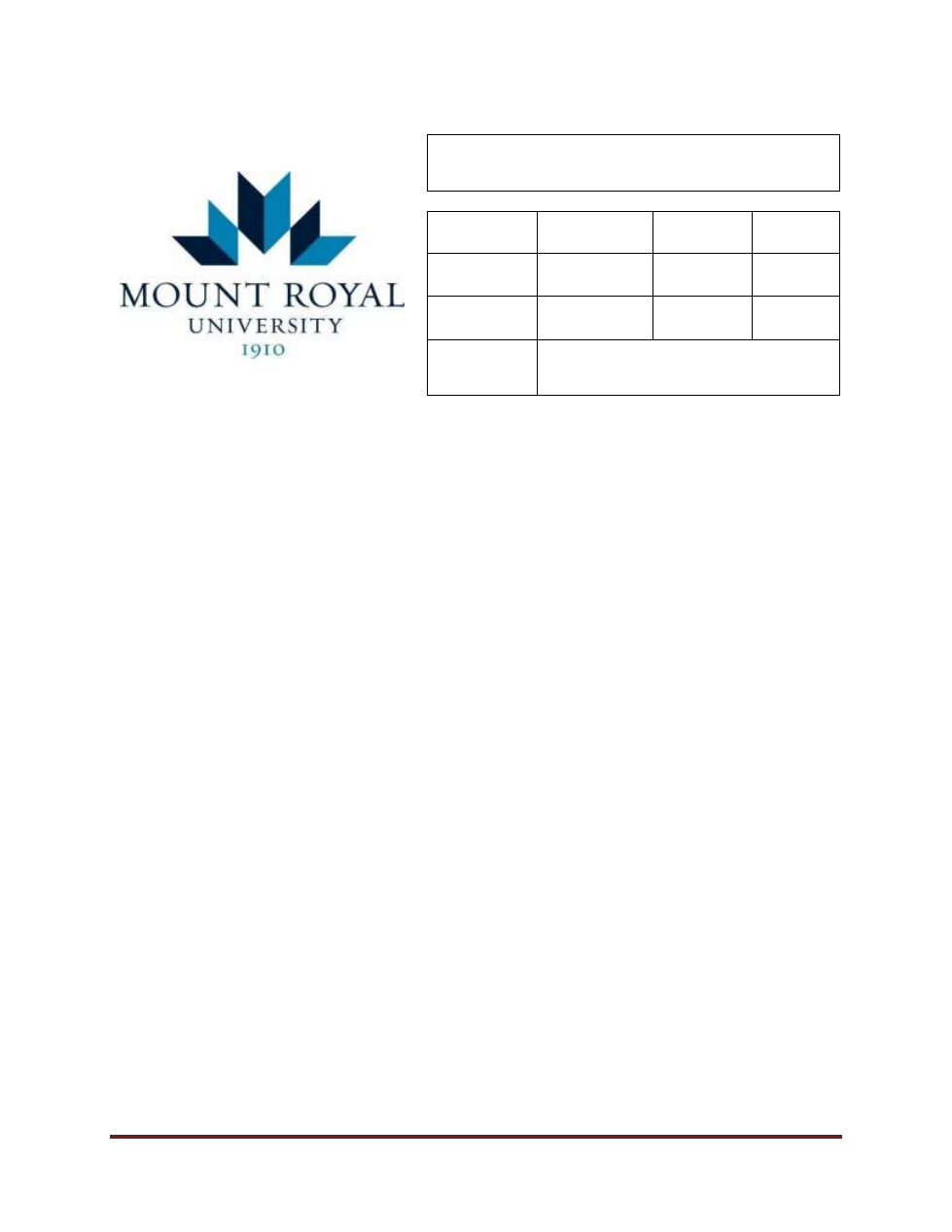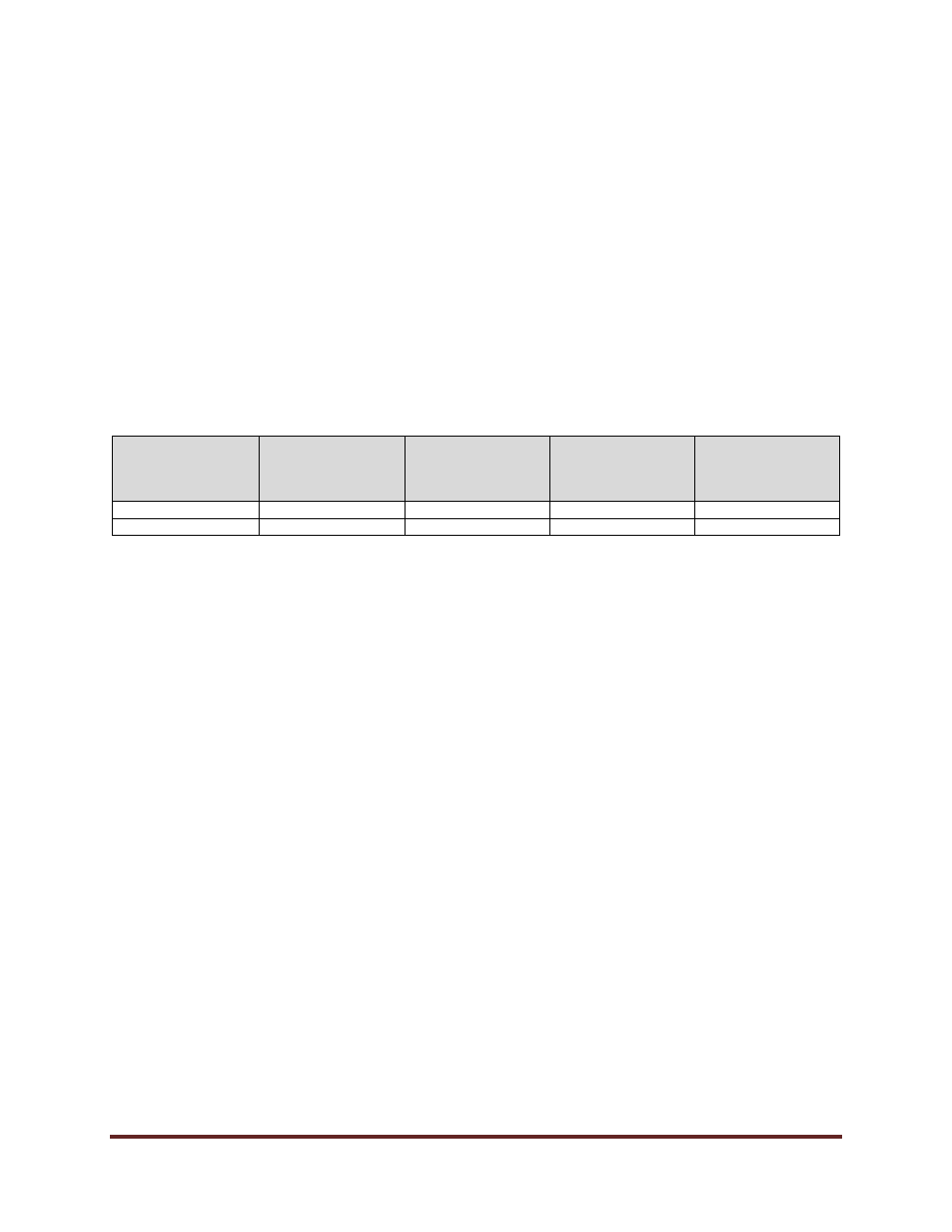
Code of Student Community Standards Procedures
– May 20, 2022
Page 1 of 6
CODE OF STUDENT COMMUNITY STANDARDS
PROCEDURES
Procedure
Type:
Academic
Initially
Approved:
May 20,
2022
Procedure
Sponsor:
Vice-President,
Students
Last Revised:
Primary
Contact:
AVP Student
Experience and
Success
Review
Scheduled:
May 20,
2027
Approver:
General Faculties Council
A.
PROCEDURES
The document outlines the procedures associated with the Code of Student Community Standards
(Code) and provides guidance on how incidents of non-academic student behaviour are reported,
investigated, and how
decisions are made regarding a violation of the Code. The procedures are
established in a manner that upholds the administrative principles of procedural fairness and strive
to use Trauma Informed Practices.
The Office of Student Community Standards (OSCS) is the department responsible for the
administration of the procedures associated with the Code. A member of the University Community
can contact the OSCS confidentially to discuss the Code reporting options and to provide
explanations of these procedures.
1.
REPORTING
1.1
Anyone can submit a report to the OSCS. Individuals may choose to report in person,
in writing, or using the online form. Reports, when possible, should:
a. be submitted in a timely manner, preferably within 24 hours of the incident or
when it is safe and appropriate to do so. There is no set time limit on filing a
report as long as the harmful behaviour has taken place while the Respondent
was a Student and is a member of the University when the report is filed;
b. include all relevant information about the incident including; date, time,
location, people involved, description of what occurred, any attempts to
address the behaviour, and the desired resolution(s);
c. include information about who is submitting the report as most cases of
anonymous reporting will limit ability of the University to fully apply the Code
due to insufficient information and the ability to ensure procedural fairness to
all parties involved;
d. provide any individual involved within the Report, and the subsequent process,
support and the option to have a Support Person present at all times
throughout the process.

Code of Student Community Standards Procedures
– May 20, 2022
Page 2 of 6
2.
INTERIM MEASURES
2.1
Upon the review of the Report, if the OSCS and Security Services deems there to
be an immediate, ongoing, or possible risk to others or the University, interim
measures will be issued as outlined in section 5.0 of the Code. These measures are
preliminary in nature, and non-disciplinary, and do not imply the individual(s) has
violated the Code. Measures may be assigned for all or part of the Code process
Any Interim Measure applied will be reviewed every seven (7) days and renewed if
necessary pending the decision from the Code investigation. Any individual assigned
and/or those impacted by an Interim Measure will be informed in writing.
3.
MULTIPLE PROCEEDINGS
3.1
Circumstances of some incidents may involve actions of a Student that intersect or
engage with other University policies or processes. When a Report involves possible
violations of the Code and other University processes, the OSCS will consult with
those responsible for the administration of the other policies to determine which
process should be applied and in which order. When appropriate, joint investigators
would be assigned to represent the respective processes. When multiple
proceedings are involved the Respondent will be informed of the process that will be
used for investigating and resolving the Report.
4.
INVESTIGATION
4.1
All Reports involving possible violations of the Code will be reviewed in a timely
manner by OSCS to determine whether or not the Code applies. Where appropriate,
the Report may be referred to another University Official or University policy or
process. The decision to enact the following Procedures is determined based on a
variety of factors, primarily, the desire of the Complainant to engage in the resolution
process and their desired resolution(s). A representative from the OSCS may choose
not to engage or to delay these procedures under the following circumstances:
●
all parties are in agreement on actions to bring about an appropriate
resolution;
●
alternative resolutions pathways are available;
●
there is insufficient information to commence a process;
●
concern for the safety, wellbeing of parties involved;
●
the existence or potential of criminal or other proceedings;
●
there is sufficient information that the report is frivolous or being made with
malicious intentions
4.2
When the OSCS determines that a Report is to be investigated under the Code, an
investigation process will include steps such as:
a. Determining who is the Complainant(s) and Respondent(s);
b. Consulting or conferring with University Officials in the determination of
appropriate processes when necessary;
c. Assigning a trained Investigator who will commence the fact-finding process
by gathering and reviewing relevant information in addition to interviewing
persons involved in the report;

Code of Student Community Standards Procedures
– May 20, 2022
Page 3 of 6
d. Meeting with the Complainant to outline the process, review their rights, hear
their account of the behaviour(s) and corresponding impact, review the
information submitted as part of the report, and discuss their desired outcome;
e. Notifying the Respondent in writing of the investigation of the Code, including
a general description of the alleged behaviour and an invitation to meet with
the Investigator to respond to the allegations;
f.
Meeting with the Respondent. The purpose of the meeting is to receive a more
detailed description of the allegation(s), and to review the process. Only
following this step, will the Respondent be asked to respond and share their
account of the Report. Should the Respondent choose not to participate in the
investigation process a determination of responsibility will be completed using
the information available;
g. Gathering other relevant information and/or conducting interviews with
Witnesses or others with knowledge of the Report;
h. Summarizing the findings into an Investigation Findings Report upon
completion of the investigation to be used to determine the appropriate
resolution.
5.
DECISION MAKING AND RESOLUTIONS
5.1
The facts included within the Investigation Findings Report will determine the
appropriate Decision Maker, specifically the information regarding the severity of the
harm caused as a result of the behaviour and whether or not the Respondent accepts
responsibility for their behaviour and/or agrees to a resolution.
5.2
Cases whereby the Respondent takes responsibility for their behaviour(s) and/or or
where there was limited harm caused may be resolved by an OSCS representative.
The OSCS will work with the Respondent to assign appropriate resolutions, as
outlined within Section 8.2 of the Code, in a manner that amends the harm caused
to the Complainant and/or of the University Community.
5.3
Cases whereby the Investigator is unable to resolve the incident and/or where the
behaviours caused significant or repeated harm to the University Community, the
Executive Director of Student Affairs or designate will serve as the Decision Maker
and engage the following process:
a. The Investigator will provide the Respondent an opportunity to review the
Investigation Findings Report and pose questions in writing to the Investigator.
All parties will receive the written responses to the questions posed, if deemed
appropriate and not to cause harm or breach a person’s reasonable right to
privacy.
b. The Executive Director may appoint a delegate or additional decision maker
where necessary, for example to include the Dean of the Respondent’s
program. The Respondent and Investigator will be informed prior to any
meetings;
c. A meeting will be held with the Respondent, the Investigator, and the Executive
Director. At this meeting the Respondent and Executive Director are provided
the opportunity to ask questions of the Investigator regarding the Investigation
Findings Report, the process, or of each other;
d. The Executive Director may choose, if applicable, to meet with the
Complainant to review the Investigation Findings Report and/or discuss the
impact of the behaviour;

Code of Student Community Standards Procedures
– May 20, 2022
Page 4 of 6
e. If the Executive Director finds the Respondent to have violated the Code they
may assign one or more of the Resolutions as outlined in Section 8.4 of the
Code.
f.
The Executive Director will provide written notice of their decision, including
their rationale and any resolutions assigned, to the Respondent, within ten (10)
business days of the meeting.
5.4
All decisions regarding a finding of responsibility and thus a violation of the Code,
will be made using the standard of the balance of probabilities; whether it was more
likely or not to have taken place. The Decision Maker will determine the finding of
responsibility and, if necessary, appropriate resolution(s) by considering the relevant
facts of the case and such factors as:
●
Extent of the misconduct;
●
The harm caused by the behaviour(s);
●
Whether the behaviour was inadvertent or deliberate in nature;
●
Whether the behaviour was an isolated action or as part of a pattern of
behaviours;
●
Whether the behaviour can be reasonably understood to be the result of a
documented health condition or other extenuating circumstances;
● Any other mitigating or aggravating circumstances.
6.
APPEAL
6.1
A Student who has been found responsible for a breach of the Code, may request
an appeal of the decision to the Student Appeal Committee as outlined in the Student
Appeal Policy.
7.
REPORTING AND RECORDS
7.1
All documents and records collected as a result of these policies and procedures will
be maintained in compliance with the University’s Records Policy and the Alberta
Freedom of Information and Protection of Privacy Act. The OSCS is responsible for
maintaining all records separate from a student’s academic record. The OSCS will
prepare an annual statistical report of all misconduct addressed according to the
Code for the General Faculties Council
– Student Affairs Committee. This report
shall be anonymized and ensure no identifying information is included.
B.
DEFINITIONS
(1)
Code:
means the Code of Student Community Standards.
(2)
Complainant:
means the person or harmed party, who brings forward
information that a violation of a policy may have occurred.
(3)
Decision Maker:
means the person responsible for determining whether or not a
violation of a policy has occurred and assigns a resolution.

Code of Student Community Standards Procedures
– May 20, 2022
Page 5 of 6
(4)
Investigator:
means the individual, either internal or external to the
University, responsible for collecting the facts of a Report.
(5)
Investigation Findings
Report:
a document prepared by the Investigator that outlines details
regarding the investigation of a Report including the details of
the investigation, statement of facts, and finding.
(6)
Report:
a statement to the University seeking recourse pursuant to the
violation of this policy.
(7)
Respondent:
means the individual alleged to have caused harm and violated
this policy.
(8)
Student:
means someone who has applied to a full-time, part-time, credit
or non-credit program or course offered through the University.
(9)
Support Person:
an individual, unrelated to the Report/incident, who can attend
meetings with a Respondent or Complainant throughout the
course of an investigation or appeal to provide personal
support but may not speak on their behalf.
(10)
Trauma-Informed
Practice:
means an approach for engaging with Individuals that involves
understanding and recognizing the presence of trauma
symptoms and the impact of trauma on the individual.
(11)
University:
means Mount Royal University.
(12)
University Community:
includes Students, Employees, the Board of Governors,
Contractors, Volunteers and Visitors to the University.
(13)
University Official:
a person acting in the capacity as outlined by their employment
at the University.
(14)
Witness(es):
means an individual who was present, either immediately
before, during, or after an incident who may have information
regarding the Report/incident.
C.
RELATED POLICIES
● Academic Accommodation for Students Experiencing Disabilities Policy
● Acceptable Use of Computing and Communication Resources Policy
● Code of Conduct – Employees Policy
● Code of Student Community Standards Policy
● Expression and Free Speech Policy
●
Human Rights Policy
● Sexual Violence Response Policy
● Smoking Policy
●
Student Appeal Policy
● Universal Access Policy
● Workplace Violence and Harassment Prevention Policy

Code of Student Community Standards Procedures
– May 20, 2022
Page 6 of 6
D.
RELATED LEGISLATION
● Alberta Freedom of Information and Protection of Privacy Act
● Alberta Health Information Act
● Alberta Human Rights Act
● Alberta Occupational Health and Safety Act
● Alberta Post Secondary Learning Act
● Canadian Charter of Rights and Freedoms
● Gaming, Liquor and Cannabis Act of Alberta
E.
RELATED DOCUMENTS
● Report Form
F.
REVISION HISTORY
Date
(mm/dd/yyyy)
Description of
Change
Sections
Person who
Entered Revision
(Position Title)
Person who
Authorized
Revision
(Position Title)





